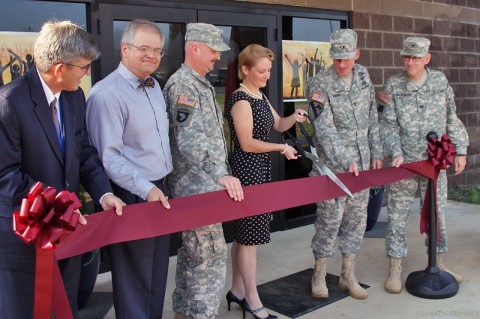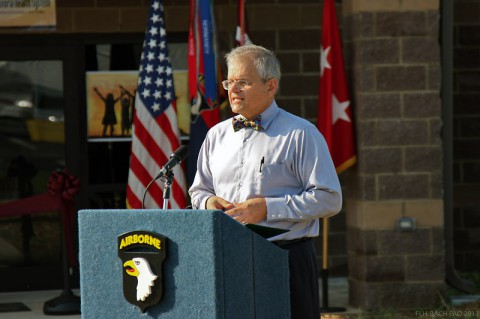 Fort Campbell, KY – The Child and Family Behavioral Health System officially opened at Fort Campbell August 27th as the senior leader of the 101st Airborne Division (Air Assault) and Fort Campbell, community supporters Staff Sgt. Aaron and Melissa Fast as well as the commander of Blanchfield Army Community Hospital and community partners help cut the ribbon, formally opening the doors to the Fort Campbell community.
Fort Campbell, KY – The Child and Family Behavioral Health System officially opened at Fort Campbell August 27th as the senior leader of the 101st Airborne Division (Air Assault) and Fort Campbell, community supporters Staff Sgt. Aaron and Melissa Fast as well as the commander of Blanchfield Army Community Hospital and community partners help cut the ribbon, formally opening the doors to the Fort Campbell community.
The CAFBHS is the Army’s model to provide behavioral health services to military children and their families. Blanchfield Army Community Hospital will serve as the Southern Regional Medical Command’s prototype for the system of care.

Blanchfield Army Community Hospital commander Col. George N. Appenzeller said that the building is not really what we are recognizing today. “This is a symbol of the Army’s continuing commitment to Soldiers and Families. Over the last 13 years of persistent conflict, the one thing that has been true is the strength of our Army is our Soldiers and the foundation and bedrock is the strength of our Families.”
The CAFBHS team will promote prevention, active collaboration, consultation, and partnering between behavioral health specialty providers who see Family members and their primary care managers inside the Patient Centered Medical Homes.

CAFBHS Director Dr. Quentin Humberd said, “Nearly 60 percent of our soldiers have family responsibilities, and that has resulted in more than two million of our children being exposed to at least one parental wartime deployment over the last 11 years.”
“No one believes this is an easy task. However our soldiers and their families have demonstrated remarkable courage, resilience and perseverance; they deserve our ongoing thanks and our ongoing support.”
Humberd told ceremony attendees that the care should be seamless and patients should experience healthcare that recognizes that behavioral health or mental health are no different than health.
According to Humberd, “The CAFBHS building is a symbol of the commitment we have to implement this system of care. The system will continue to grow over the next three years.”
Humberd asked for the support from providers and programs to align services to support the model. “We will leverage technology to deliver behavioral health care and consultation and provide training where there are recognized gaps.”
Humberd ended his comments during the ceremony with a Henry Ford statement that applies to his belief in success of the CAFBHS model, “Coming together is a beginning, keeping together is progress, working together is success.”


